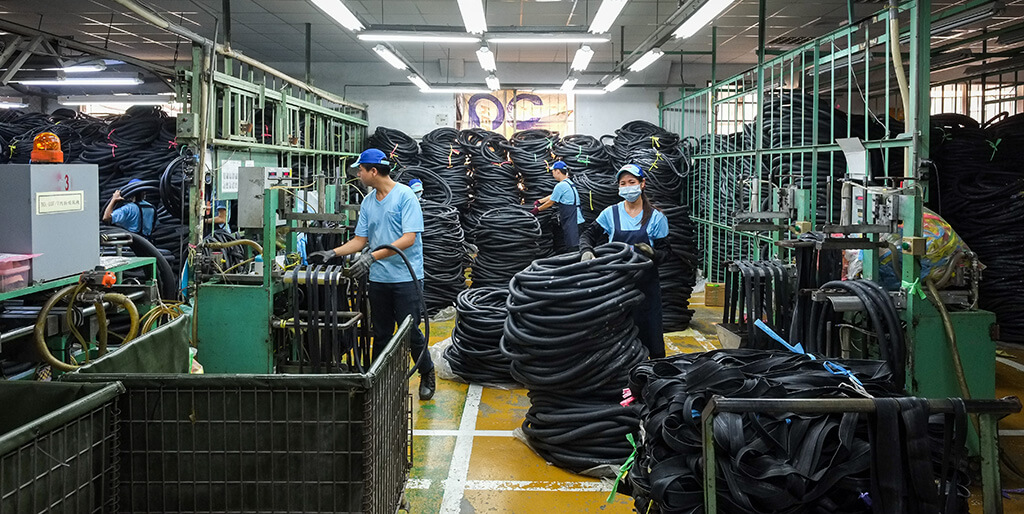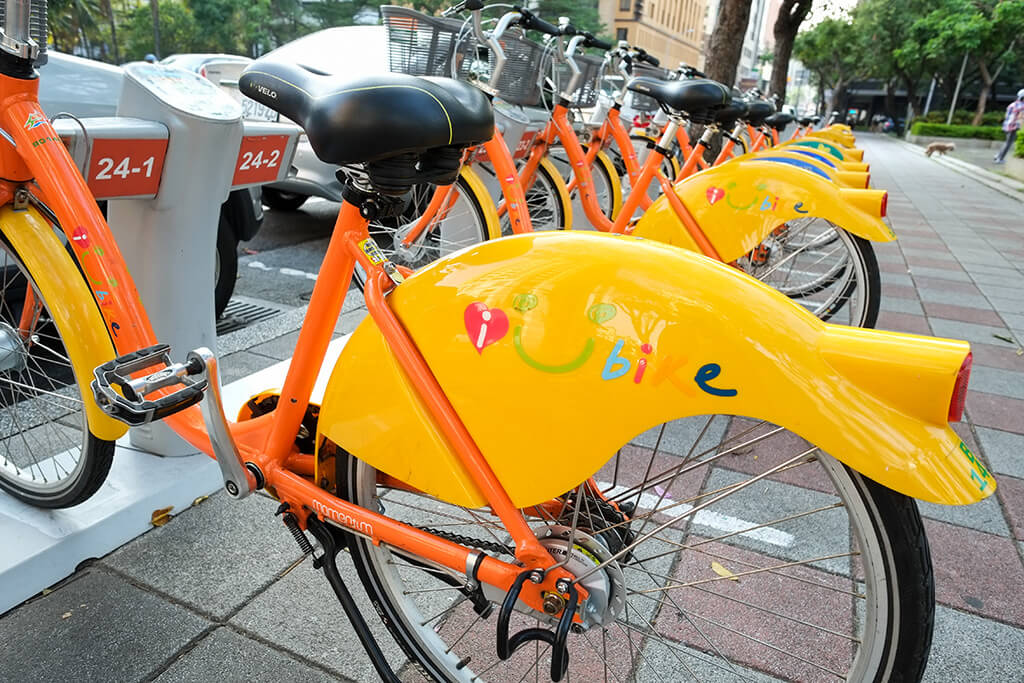Autumn Gear Guide
Find inspiration in our Gear Guide that will keep you out on your bike through wind or rain.
Download NowThe global manufacturing hub churns out a staggering amount of the frames and components we’re familiar with.
Made in Taiwan. These words have become ubiquitous in the bicycle industry. Taiwan, a small, island nation off the south eastern coast of China, where so many parts of bicycles North Americans ride are manufactured, has been known since the 1970s as “The Bicycle Kingdom.” Everything from frames, chains, and pedals to grips, lights, and cycle computers are made in factories mostly clustered in Taichung City on the western coast.

Workers at Kenda Tire test every tube by inflating and grouping, later returning to discard those with leaks. All photos by David Niddrie.
While China now produces an abundance of bikes and parts too, Taiwan has mostly left behind the low-end market to focus on mid-level and high-end cycling products. Homegrown brands are known for innovation and expertise in manufacturing. On a recent media tour of 10 production facilities and an introduction to a dozen more Taiwanese brands, it was clear that cycling is a major part of the economy and has been for some time.
Giant, the world’s largest bike company, was established in 1972 with the Giant brand unveiled in 1981. Since that time, Giant has become a global leader in bike production, both under their own brands – Giant, Liv, and Momentum – and for a growing number of high-end clients. They were the first company to mass-produce carbon fibre for bikes in 1985 and their Taichung factory is where some ‘competing’ brands’ carbon fibre products are made. It was very interesting to see the mix of brands all being built under one huge roof, often side by side on the assembly line. Above you, bike frames move around in a maze of conveyor tracks, heading from one department to the next. Employees work quickly as the bikes roll by in a seemingly endless fashion, with hoses, ducts and cables visible in every direction. In 2014, Giant reported $2-billion USD in corporate revenue, with 6.6-million bicycles sold (compare that to 3,800 in 1972). The company now has nine factories, including six in China and one in Japan, with products available in 80 countries at 10,000 retailers. Giant was the first stop on our tour; it set the scale dramatically.
The Kenda Tire headquarters, just south of Taichung, looked old school from the outside and inside was no different. Founded in 1962, Kenda began as a bike tires and tubes factory, eventually expanding to produce all kinds of tires, except for aircraft. This factory is all industrial clang and the smell of rubber was pervasive. They make tires for Giant, Specialized, SCOTT, Merida, Trek … Like many of the factories we visited, companies are in close contact with their competitors in production. Now with six factories in the region (including China and Vietnam), Kenda produces hundreds of thousands of tires a day. They employ more than 10,000 people and plan to open three more factories in 2017. Again, the scale is mind-boggling when you realize how much North American bike stuff comes from this part of the world.
Later that week, we visited King Roof (vehicle racks), Marwi (a huge producer of bike parts, including a good chunk of the world’s pedals), and KMC Chain (a chain company claiming a 78 percent global market share). According to KMC, if you measure all the chain made since their founding in 1977 it would stretch more than 2.5 million miles (four million kilometers)! We also visited the factories of Taya Chain, Kind Shock Hi-Tech (KS of hydraulic drop-post fame), and Hubsmith to further illuminate the Taiwan bike connection.
One of the highlights was Velo Enterprise, makers of Velo saddles, grips, and tapes founded in 1979 by Stella Yu. This company produces 15 million saddles and 20 million grips annually with four factories in Taiwan and China. Yu still heads up the company and her fiery, passionate presentation revealed how she was able to make it in this male-dominated industry. She told us how she got tough quickly in the traditional business setting while keeping her vision intact along the way. She explained the inspiration for color and design comes from feng shui and that Velo makes saddles for each year in Chinese astrology. Yu shared her spiritual side by taking our entire group out to her favorite Buddhist temple that evening while playing the part of tour guide (naturally, to the Dajia Zhen Lan Temple which is dedicated to the female goddess, Mazu). Her latest focus is on e-bike saddles (with a built-in handle for lifting the bike) and her passion projects – saddles for push bikes and children. Acknowledging most of their product is made from chemicals, Velo claims strict compliance with international standards and Yu specifically works toward minimizing exposure to toxins in their children’s line.
Our last visit was to Lezyne, an American company now in their ninth year making products at their own facility, surrounded by rice fields and farms on the outskirts of Taichung. This was the most modern and worker-friendly location on the tour. Instead of being hot and humid, Lezyne’s facility was cooled by air-conditioning units imported to maintain comfort in production. It was significantly quieter, too, as a full-time machine shop this is not. Lezyne sources most of their parts from vetted suppliers, then tests the raw parts piece by piece before assembly. Once functioning, parts and products are tested and, after packaging, randomly tested again. The level of quality control was beyond anything else on the tour. Every aspect of their new GPS line – coding, electrical, design, marketing, and more – is done in house. It’s clear Lezyne owns its brand and image in all departments. For deeper consistency, and perhaps a quirky indulgence, the Taiwan office is a replica of their San Luis Obispo, CA headquarters, seemingly down to the bowl of Smarties in the kitchen.

YouBike, Taiwan’s public bike share system, had 30 million trips in 2014. Photo by David Niddrie.
Apart from the vast, industrial network for bike production in Taiwan, what’s it actually like to ride there?
The influence of bicycle manufacturing on the country is becoming clearer at the street level. Giant helped launch the YouBike bike share program that began in Taipei and now includes 10 other cities like Taichung farther down the coast. YouBike more than doubled its national, annual ridership from the previous year to 30 million trips in 2014. Infrastructure is being built, too. Now it’s possible to ride around much of the country on connected bike paths and right of ways. A ride around Sun Moon Lake, Taiwan’s largest inland lake, features long stretches of separated pathways.
On the streets of Taichung, the motorized scooter still rules the road; transit and private automobiles fill in the rest. The bike share was being used regularly on the Sunday of the popular Taichung Jazz Festival while I was there. Other than that, it wasn’t very common to see groups of riders, just the odd folding-style bike (20-inch wheels are popular) mixed in with all the scooters.
The Tour de Taiwan, Giant’s Ride Like King event, and the Taiwan Cycling Festival in the autumn bring interest to the sport side of cycling. Velo-city Global Conference 2016 kicked off an intense two weeks of cycling events in Taipei. The five-day program focusing on city cycling was followed immediately by the Taipei International Cycling Show (the largest in Asia) and the 2016 Tour de Taiwan, part of the Union Cycliste Internationale Asia Tour.
Whether or not the people of Taiwan embrace transportation cycling as enthusiastically as sport cycling remains to be seen. The factories are there, the brands are maturing, and it appears the political will to increase ridership is following. With Velo-city injecting fresh ideas and energy into the realm of city bicycling, the growth of bike share, and an expanding network of cycling paths in Taipei and elsewhere, this small island has a lot to build upon.
As Anthony Lo, Chairman of the Taiwan Bicycle Association and Giant Global Group CEO, said at our press conference, “Taiwan has become not only the centre of manufacturing and R&D, it has become a cycling island.” A strong commitment to create city-cycling friendly cities will help Taiwan ensure this new nickname sticks and accurately describes their place in the global bicycling scene.
David Niddrie spent a week in Taiwan visiting factories, eating veggie hot pot and gaining further insight into the bicycle industry. You can read his trip report and slideshow on riding around Sun Moon Lake here. All of the above photos were taken by David. davidniddrie.com
Momentum Mag gratefully acknowledges the support of Taiwan External Trade Development Council (TAITRA) for this trip.
Find inspiration in our Gear Guide that will keep you out on your bike through wind or rain.
Download Now
how many manufacturers are there in Taiwan???
Excellent article, and glad to see Momentum singing the cycling praises of my adopted homeland. I still need to get off my keister and do a Taiwan cycling story for you. When are you heading back? We can circle the island together.
Comments are closed.